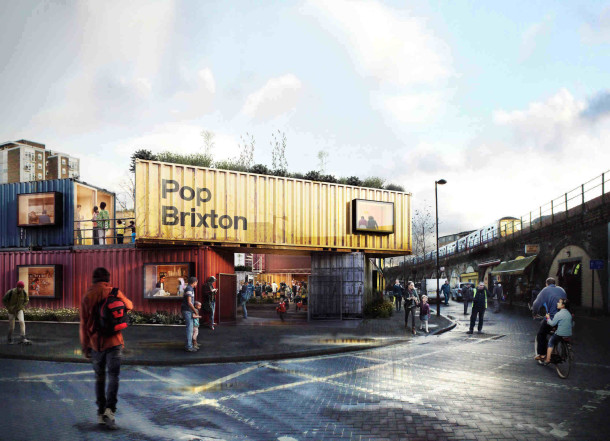By Rebecca May Johnson
Henry Dimbleby and Jonathan Downey’s new mega gastro-enterprise London Union positions food markets as the saviour of “derelict” neighbourhoods with the alleged aim of bringing “communities together” and “breathing new life into dark spaces.” It plans to open 20 new markets with each one “designed to reflect the community it serves.” London Union appropriates the language of workers’ struggles and uses the hashtag #jointheunion online.
A quick glance at the last five years in neighbourhoods targeted by street food entrepreneurs, however, proves that existing communities in real need are the last people to benefit from street food markets (read: not at all). In fact, the arrival of a hot new food market has so far been a guarantee of social cleansing, council tenant evictions and a feast for property speculators.
Brixton is a textbook example and I was part of it. Back in 2009, living for “mate’s rates” at my friend’s house in Brixton, we rejoiced at the new, cheap restaurants that opened in Granville Arcade, recently rebranded as “Brixton Village”. Encouraged by Space Makers, an agency who were paid to help develop the market, landlords allowed temporary free tenancies for restaurants. Unsurprisingly, just after the financial crash, applications for spaces flooded in. It was the eve of the tidal wave of specialist coffee / burger / posh chicken restaurants. We drank cheap wine and hung out in the semi-open space of the covered market. It felt like the Berlin I had known in my year abroad in 2006 and not like the corporate London of endless Starbucks and Zizzi chains. We invited friends from other parts of town to come and partake of the new fun in Brixton.
The initial buzz gained momentum, aided by mouth-watering Instagram images – including those posted by me. More places popped up, queues formed, the BYOB policies ended, TimeOut made a video tour of the market, and “Champagne and Fromage” moved in – a restaurant that unwittingly became the poster boy for Brixton’s gentrification. There was a “turning point”, when I recognised some boys from the private school next to my comprehensive in rural Suffolk in the market one night, drunk on Red Stripe and loudly singing a grime song in a badly copied south London accent into a microphone. It made me cringe.
Middle class twenty-somethings I knew (my peers, let’s be honest) were bought flats in the area by wealthy parents, now that Clapham had become unaffordable and “boring”. I overheard conversations on the Victoria line, where Brixton converts enthusiastically informed hesitant friends that the area was “OK now”, before listing the market’s best restaurants and naming other (white, wealthy) friends who had recently moved there, as proof.
Meanwhile, Brixton was becoming a lot less hospitable for other people, namely, many of its existing residents.
The cultural capital and hard cash brought in by the fashionable food businesses made the area attractive to property speculators and caused market landlords seek to raise rents. Nour Cash and Carry was dealt a 22% rent rise that would have forced them to close, had not fierce campaigning put a stop to it. Long standing favourite Kaff bar is the latest victim of hiked up rents, and will serve its last drink next month. Other favourites to close include the bar and restaurant Mango Landin’ which will soon be turned into flats.
As a direct result of the roaring success of the market, Lambeth council, impoverished by cuts from central government saw the size of their property assets in the centre of Brixton skyrocket. The council has evicted hundreds of long-standing residents from council residences and short-life housing, before selling them off to developers or dubious private finance initiatives that never replace as many council homes as they demolish.
Network Rail is cashing in too, with forced evictions of long-standing shopkeepers, many of whom have had their businesses there for 30 years or more. Under the claim of “urgent maintenance” for the arches (which has seemingly become urgent because they didn’t bother with it when it was mainly poor, black people living and shopping in Brixton) Network Rail are forcing traders out. Rents will be tripled after the work is finished, effectively wiping out existing businesses, making way for the likes of Wahaca who, ominously, have opened their first site opposite the condemned arches.
So, who do street markets feed, other than food entrepreneurs, who aspire to build chains from their start-ups, and sell them off to venture capitalists and, of course, the ‘foodie’ middle classes?
Honest Burgers has sprouted into a ubiquitous chain since it opened in Brixton Village in 2011, and raised £7 million earlier this year. Franco Manca, founded in 2008 now has 10 venues all over town and sold for £27.5 million this March. Fair enough – both of these places serve excellent food – but it is hard to see how they function for social good where Brixton needs it most.
In what seems like a gross misjudgement on the part of Lambeth council, POP Brixton, consisting of a ‘village’ of brightly painted shipping containers, was given the use of the council land for free until 2017 when the site will be redeveloped — on the promise that it would provide benefits for the community.
Originally POP was going to be run by Edible Bus Stop, but after relationships broke down with EBS unhappy with the way things were going, the council forged ahead and brought in creepy sounding company “The Collective” (again, appropriating socialist rhetoric) to co-run the project. “Tenants have been selected based not only on the quality of their offer, but also to maximise benefit to the local community” – says the press release. Seriously? A visit proves that it is nothing less than a theme park of fashionable food, from pinxos to ramen noodles, with zero visible benefit to Brixton residents – other than a few new flavours for those who can afford it.
Very few of the small food businesses themselves will make the kind of money that Honest Burgers are seeing and their staff work for low wages often on zero hour contracts. The issue is at the level of council planners and property developers – who, Dimbleby declared in an interview in the Evening Standard, should seek to work with “London Union” to liven up spaces where major development will take place.
Locations targeted by food markets almost always coincide with major development that eventually evicts poorer residents and ushers in the wealthy. The shipping container market on the site of the recently demolished Heygate Estate in Elephant & Castle is an unconvincing attempt to create buzz around the new identikit flats and to distract from the forced exile of thousands of council tenants. Streetfeast in Dalston, Kerb in King’s Cross and Riverside Feast at Battersea Powerstation all sprung up where councils have sold off tranches of land to speculators. All the “home-made” aesthetic of the food markets has done is to veil crass, big bucks development while it’s underway, or to increase the value of land.
The proliferation of food markets and of gastro-entrepreneurship in London has taken place alongside the rise of food banks and the numbers of those going hungry. More food markets does clearly not equal fewer people going hungry.
How about some food planning in Brixton that does some genuine social good, like community kitchens that work alongside foodbanks to provide free or cheap hot food for those who need it as well as much-needed social interaction?
I love a juicy chuck-steak burger in a steamed demi-brioche bun as much as the next red-blooded woman, but let’s not mistake eating one for an authentic commitment to social change.
Rebecca tweets at @rebeccamjohnson and you can see more of her work on her website here.


















I lived in Brixton for 10 years and left in 2007. I have obviously missed this transformation and I’m sorry about it. I would have loved living in the new Brixton.
The Brixton I experienced was dirty, you were made to feel intimidated by men and women on the street, having to ask dealers and working girls if they could push aside so I could enter my front door (Vining Street).
There are some good people too and we had some fun, but having to walk my head down not to attract attention all the way from the tube station to my house was definitely not a fun experience.
Black people were already complaining that too many whites were coming to the area, I’ve never understood why they wanted to live in a ghetto.
Things don’t stay the same forever, it’s up to you to seize opportunities and stop moaning.
Please do not presume that weariness or concerns in regard to gentrification are coming from one particular ethnic group. Brixton has been diverse for many years. Your sentence in regard to ‘Black people’ is a sweeping generalisation.
I agree it’s a generalisation but it’s also because I heard it over and over and it was always from the same “etnic group”.
Good article thanks for posting; read via diaspora social network, so please join the revolution against corporate social media! 🙂
https://diasp.eu/posts/3334573
What absolute drivel. Sentimental claptrap.
Everything’s been spoilt for you hasn’t it. Its all ‘their’ fault.
Obviously posh: opinion means nothing
Wish this article would make readers reflect on the form that change has n whether it s viable for PEOPLE living in this area of the PLANET and how PROFIT can serve all of us. Instead comments r about who was there first, who s left, right, white, black, rich, poor, capable, incapable..
“Artisan” – what a horrible word. What millions of people have done humbly and without fanfare for years; make homemade food. Now turned into something full of mystique and over-inflated in price.
It’s like a distortion of the Weimar Republic, but instead of using a wheelbarrow full of money to purchase a loaf of bread through despair it’s done with pride.
Quite the skill you have there to be able to determine just from eavesdropping on the Victoria line that the subject of the conversation was white and wealthy.
What a repugnant outlook you have. How foolhardy of everyone else to think they could sip artisan coffee next you because they weren’t there first.
Grow up and move on, seriously.
The temerity you have to think you can complain about the social composition of an area because it doesn’t suit your leftist utopia stinks.
But do you agree with gentrification or not? Was the actual point of the article
Gentrification isn’t a concept in itself, it’s a byproduct of economic migration.
Viewpoints like this are remarkable, they are mostly spouted by the left and so asinine in that they are usually accompanied by left leaning pro-immigration preferences.
It wouldn’t be PC to actively protest and virulently debate the effect that foreign immigrants have on an area, but economic migrants within the UK (from less fertile jobs markets elsewhere) and from other parts of London (looking to experience new areas) are fair game.
Worst, these complaints are usually from the mouth of a white person who believes that t0 was the day they landed in Brixton.
This article is so patronising I really don’t know where to start , a white middle class person writing about herself as part of the problem and suggesting food banks etc to help poor blacks, oh dear! So black people cannot be part of this new wave or are we so helpless that we can only feature in the talk about food banks and ‘commumity’ issues – and isn’t this new wave of street food markets happening all over and not just Brixton. And is Brixton the only area in which black people and the poor live and are the two always linked ? I gather maybe you are quite young but when it comes to black peoples in Brixton they have never owned the majority of businesses in the past but are now in a better position to do so with a younger generation who can position themselves to jump onboard unlike their parents or grandparents. Not taking away from
The point made re the greed of councils like Lambeth selling off everything to the rich whites x city types, but this is happening on all fronts, in education, housing etc. it is our whole existence that is being robbed and given to certain players, street markets are probably one of the few areas where those not operating in that league can get some sort of a foothold !
This article is disastrous. Awful. The suggestion inherent in the phrase:
“…and naming other (white, wealthy) friends who had recently moved there…”
that a person’s acceptability should be a function of their skin colour is eye-wateringly misguided.
Yet again another newcomer washes up in Brixton with a bundle of preconceptions and no sense whatsoever of the area’s history. I didn’t arrive in Brixton “back in 2009”. I’ve lived here sine the ’70s and I can tell you the place is so vastly improved that I can barely put it into words.
You may have sloshed in from the fens five years ago expecting radical leftist politics, squat parties or whatever, but the people who’ve lived here through the shit couldn’t care less about all that. Exciting, successful new businesses? Social improvements? Only a colossal fool could want anything else.
Please do not write anything on this website again about my neighbourhood, which you evidently do not understand, other than in the most superficial terms. But in an attempt to stimulate some cortical activity, and if you have read this far, consider this—there is a bar up Effra Road, outside which sits bearded, tattooed fashionistas, drinking craft ales. That bar was formerly the headquarters of the Brixton Conservative Association. If you begin to follow through on the significance of that fact then you might reach the light. I wonder whether you are capable.
You’re gona feel like such a twat when you’re priced out of the area too. Arguing semantics and technicalities when a well documented internationally prevalent process is occurring with empirical evidence to support arguments against it
Can you read? The comment above refers to their real life experience of living through the changes and acknowledging the improvements that have resulted.
You’ve commented elsewhere fuming about the owners of these food businesses keeping their profits. God forbid. Jog on with your incessantly biased leftist socialist bias, it’s really preventing you from seeing the woods from the trees.
Not entirely sure I understand what you are saying here, edward, but I do understand what “gentrification” is and I also understand that it is happening in Britxton. I also understand that this is just one deep social change of many that Brixton has undergone in the last several hundred years and that expecting a neighbourhood like ours to somehow come to a halt and to stop changing is as pointless as complaining about the weather. I also know that whinging about changes in Brixton tends to be the preserve of farty middle class white kids who have arrived in the last decade bearing mushy left wing politics. All the Caribbean families in my street are well pleased with the neighbourhood becoming safer, less of a drugs supermarket and that the schools are improving.
“let’s not mistake eating one for an authentic commitment to social change.”
Let’s not mistake another “it was just so much more real when I started eating in the restaurants and bars here in 1998 / 2000 / 2003 / 2007 / 2010 / 2014* (*delete as appropriate)” article for an authentic commitment to, or indeed understanding of, social change.
Rebecca, this article is academically lazy and makes dubious connection between events with no real connection. Lambeths short life eviction policy has been going on for more than 10 years. Brixton market is a privately owned and managed market. Gentrification of Brixton has been going on for at least 30 years. Franco’s pizza place has been in the market for more than 20 years. Would love to hear your ideas on Social Change. A political manifesto ?
Franco Manca opened in 2008 – so thats 7 years, you might be thinking of Franco’s which was a different business that the new on references. This article hardly claims that gentrification has only been happening in Brixton in the last few years; but its quite clear that the changes in the markets have represented a particular shift in the neighbourhood. I’m not sure the argument you’re trying to make by pointing out that the covered markets are privately owned – the council were instrumental in connecting the landlords with Space Makers and new businesses were encouraged in with three months of free rent. Just as with Pop Brixton the language was about a social good and making a space for the Brixton community, but the outcome is clearly quite different. So I think Academically lazy is probably a bit strong.
Destroying established local businesses serving the communties living in the area to support new start-up businesses wanabe franchises which serve the entrepreneurs who can access it. How can u say “nothing wrong with that”. Plain hypocrisy.
^ this. all these businesses want is to be the next to get that multi mill buy out
It’s horrifying to see that they are some incredibly beige people still in Brixton.
There golf club mentality resistant to change.
I am by no means a champaign drinker just a northern lad who’s home has been Brixtn for 4 years.
Champaign fromage was hated and it stands, we’ve got Brindisa and whahaka now. All where slated to start. My point is that Brixton has a place for everyone. We have a labour coucil which I support. The socialists can have the outside of kfc to talk about how pop Brixton is making a mockery of Brixton because there are hardly anymore places to squat anymore.
Are you still using a Nokia or a motarola brick?!?
Move along with the times!! Or perhaps you are but your mouth can’t keep up with your feet.
Adam and Dan keep brixton buzzing without you we would still have black people standing on busses.
Love Brixton xx
This is not about Pop Brixton making a mockery of the area. It’s about ensuring that everyone in Brixton can positively benefit from the changes being made to the community. This should mean that local businesses (like L.S. Mash fish shop which has been going for 80 odd years) should not be priced or pushed out because of corporate redevelopment. As for the line that ‘we would still have black people standing on buses’ – what a ridiculous statement comparing them to the likes of Rosa Parks.
Dear Timothy
There is nothing wrong with change or entrepreneurs bringing new business into Brixton (especially if it provides employment for local people and boost the local economy). Brixton as an area has been through so much change over the past 100 or so years, from being well-to-do, to poor to affluent again. But change must not be at the expense of long-established local businesses and local residents (who may have lived in Brixton long before 1997). There is nothing wrong with bringing ‘positive’ improvements to an area (particularly if they are changes that are inclusive). But progress should also benefit long established, thriving businesses and local residents who have been in the area long before it was affluent.
Yawn and ppl like you call lefties utopianist! The nature of the pop up shop street food craze means that the jobs provided are minimum wage paying with little upwards mobility and the ad hoc set ups people see as so charmingly rustic really just cut costs for the owners while the food is still completely unaffordable. the benefits really all go to the owners and the sociopath property scum.
I love bearing witness to the changing Brixton landscape, where I have lived since 1997. I have talked to several folks in Pop Brixton and they do benefit from low rents (some of them at least) and feel very positive about the opportunity. Personally I cannot see what is wrong with this. There seems to be a sort of automatic response dominating the debate about the changes in the area which is dogmatic, and one-sided. I am enjoying the changes. 🙂
I love bearing witness to the changing Brixton landscape, where I have lived since 1997. I have talked to several folks in Pop Brixton and they do benefit from low rents (some of them at least) and feel very positive about the opportunity. Personally I cannot see what is wrong with this. There seems to be a sort of automatic response in the debate about the changes in the area which can be all too predictable. It is good to have an active debate about the pace of change but not to turn this into sheer dogma. My view.
Dear Bigman
Brixton is not Hoxton, Clerkenwell and Clapham. The only thing it has in common with the first two areas and the incredibly bland third one (which is now overrun by Bodum Barbecue devotees with a penchant for flip-flops and khaki) is that it is in London. Why don’t you take Pop over to Croydon and Thornton Heath?
Can you move to one of the aforementioned suburbs and take all your NIMBYs with you?
The so-called NIMBYs are the individuals and group who made Brixton such a magnet for newer residents in the first place. There is nothing wrong with suggesting Pop take it’s business over to Croydon. Its meant to be up and coming. I’m sure they’d thrive over there.
I like the variation of eateries in Granville Arcade but I knew it was all going to hell when I saw a ‘Tim nice but dim’ lookalike snaffling his Thai meal with a blanket wrapped round his shoulders. It was like an off kilter Tommy Hilfiger advert. I pray that Peckham doesn’t go the same way (altough it’s starting to!)
Peckhams fucked already. Have u ever been there on a fri or sat night? Rye lane literally end to end cunts going to soul nights. Fuckin makes me sick
Congratulations on your instinctive aversion to all change, Edward. You are a true conservative, in the most literal sense of the word.
A good article but missing some facts. Pop does have a number of units available to locals and massively reduced rents. The other full price units provide a cheap way to ‘market’ for entrepreneurs. The pop space has gone from a multi-storey car park emplying 1-2 people, then a temporary ice ring to now pop, when fully open in 3 months there will be over 300 people employed. Many on the living wage, which as part of your contract is the minimum wage…
I’m fed up with new-comers (4ys you say) having rose tinted spectacles about the past. Brixton has underperformed for far too long as a London hub, now it is competing and beating other more ‘successful’ areas like Clapham, Hoxton, Clerkenwell etc.
Brixton is attracting office based start-ups that would have gone elsewhere, meaning more money is spent locally. Lastly when someone buys a place in Brixton we should celebrate them, they chose to make the largest purchase of their life here in Brixi, good on ’em.
I’ve said it before and i’ll keep saying it, other areas would give their eye teeth for a fraction of the change Brixton is going through. We lucky to be passerbys and witnesses in the changing fortunes of the best place in London, Brixton.
What a load of bollocks.
Indeed – total hogwash with their ‘Pop Brixton is for everyone bollocks’. Hopefully they’ll direct their energy and attention towards West Norwood & Croydon or better still Catford. I’m sure they’d love it!
Lived here my whole life and you’d have to be dumb, rich or a Tory to not see what’s going on in Brixton and all over ldn tbh
Nice words Adam. Couldn’t agree more.
Instead of laying blame on the entrepreneurs that this country so desperately needs why not accept that these forces are inevitable and have little to do with the byproduct that is the focus of this piece.
PS. Honest Burgers do a lot of work with Brixton Soup Kitchen so get your facts right.
“Entrepreneurs this country so desperately needs”? What this country desperately needs is for corporate Britain to pay its’ way, not for a bunch of “ideas men” whose ideas are mostly shonky and benefit no-one but themselves – certainly not the people they hire on minimum-waged ZHCs to flip their burgers – whose entrepreneurship doesn’t usually extend beyond having gone to school with someone who’s since become a money lender. Entrepreneurship is about more than fulfilling the dictates of consumption capitalism, or at least it used to be when the word meant infinitely more.
Oh, and the only inevitable force is entropy. Gentrification is not inevitable.
Another baseless comment, you sound like you’ve swallowed a manifesto. Seriously mate, get out there and speak to people. I know owners within Brixton village, I’ve also spoken with people familiar with the level of employment brought by POP – jobs which otherwise didn’t exist. But hang on, let’s not celebrate locally developed and procured employment, because Starbucks employed creative accounting last year.
Please pop to POP tomorrow and tell one of the ideas men how he isn’t worthy to stand in front of you and you deplore his money lending business which he wasn’t aware he had.
Tripe and arrogance – you’re a real gem for the area.
Entrepreneurship is about taking a risk in starting a business that will then go on to employ people. Franca Manca will employ 100’s of people between them and their suppliers will create jobs. You and your socialist posse really are a bunch of short sighted, badly educated muppets.
Why should every new project in Brixton be ashamed that it isn’t a social venture catering and helping the most vulnerable local people? It’s not to detract from the help these people so need and deserve but the constant bashing of anything with a whiff of profit is becoming tiresome. I have lived in Brixton for nearly four years now and have witnessed even over that time period the gradual change in the type of establishment in the area and feel quite passionately about the commoditisation in the form of generic identikit chains moving in. However, as far as I can see POP never did purport to be a social program even despite their unfortunate borrowing of socialist rhetoric. If you got out and spoke to the restaurateurs there you would clearly be able to see the benefits in action. I recently stopped by the BBQ food stall with a friend visiting from Australia who asked the guy serving us about his story. A young cockney from the area spoke for about 10 minutes in an excitable manner about how his friends/family had been running the business for years and were suddenly presented with this fantastic opportunity. The Jerk chicken place next door seems a similar opportunity for a long standing business. Local jobs for long standing residents, a platform to transform their businesses, hire more people and give back to their areas.
Gentrification is unfortunately/fortunately depending on your perspective a phenomenon of economics as money chases money. It would require some exceptionally skilled policy making to gain the economic improvements Brixton has received without any of the changes associated with gentrification. Granted the distribution has been far from balanced from the perspective of long-standing residents but that is a much bigger debate.
Of all options available POP is hardly the large corporate charade you’re implying. Why not leverage upon the success of these local ventures to support the continued success of local business people and harness the opportunities provided by them to explore employment opportunities for local people in need. This has to be more productive than hammering any venture which doesn’t appear to be catering solely to the poor. Times change and things move on, I lament the overflow of people in Brixton village now Vs 4 years ago, but guess what, we both caused that and the secret was out.
If you’re going to have your cake, you’d better eat it too.
Oh look, some more bullshit, or we could even call this educated bullshit. Watch this space anyway because I really don’t think this will last
Adam, you’re an idiot. An idiot who is so socially-unaware that they don’t realise that anyone born on this side of the river isn’t a “cockney”. Cockneys are east Londoners born within hearing distance of “Bow Bells” (the bells of St. Mary le Bow church). For that ignorance alone you should be exiled to Birkenhead with “I am a twat” branded onto your forehead.
Born in East London, moved to Brixton, fancy that eh! Now back to your latte and light wheatcracker snacks as you ponder where else to frequent with your smattering of geographical insights.
Don’t forget to stop by a local Jamaican shop tomorrow and inform them they got lost on their way to Kingston.
This is a really excellent dissection of what is happening in my beloved Brixton, thank you for expressing so clearly what I’ve been fuming over for quite a while!!! Including the dilemma over the ethics of eating in the market!
Couldn’t agree more. It’s a Tory’s wet dream.